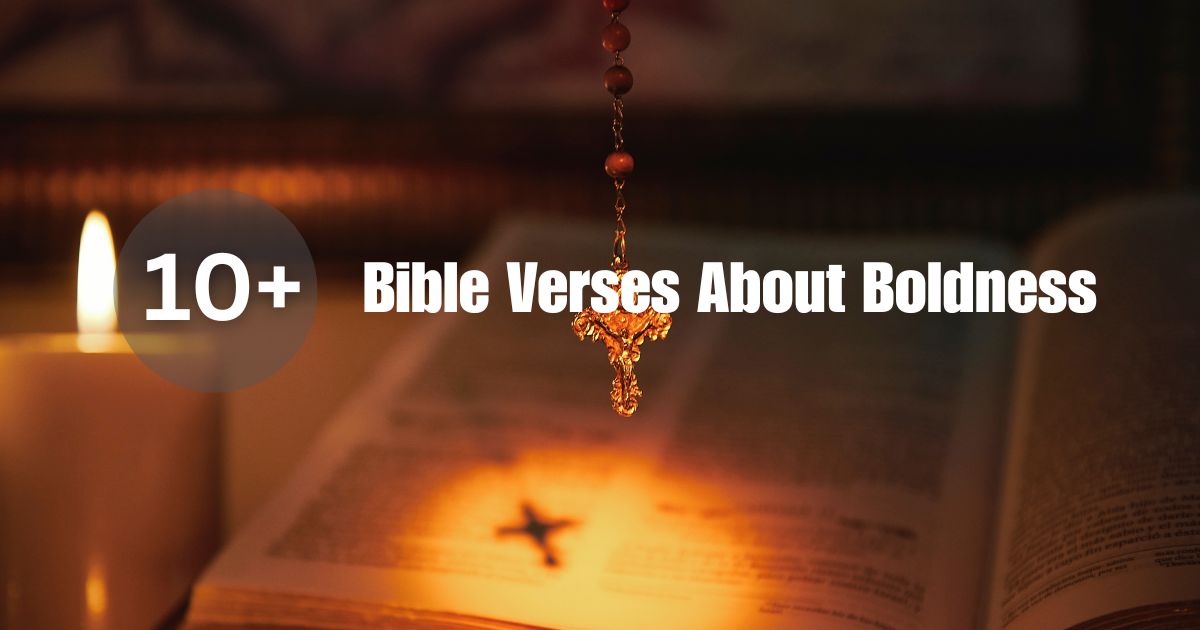Have you ever felt that nudge to speak up, to share a word of hope, to stand for what’s right, or to pray for a stranger, only to feel your heart pound and your mouth go dry? If you’ve ever stayed silent when you knew you should have spoken, you’re not alone. That feeling, that tension between faith and fear, is a universal struggle.
But what if you could access a source of courage that is greater than your fear? What if boldness wasn’t a personality trait you were born without, but a spiritual strength you could develop?
This guide is designed to do more than just show you Bible verses about boldness. It’s meant to equip you with the understanding and practical tools to live a life of powerful, Spirit-enabled confidence. We’ll explore what biblical boldness truly is, discover its source, learn from key scriptures, and most importantly, uncover how you can practice it in your daily life.
What Does The Bible Say About?
The phrase “What Does The Bible Say About?” reflects a deep and timeless desire to seek wisdom, guidance, and truth for life’s questions and challenges directly from the Christian scriptures. Instead of relying solely on personal opinion, popular culture, or modern philosophy, this approach turns to the Bible as the foundational authority. It acknowledges that the Bible addresses the core aspects of the human experience, from relationships, purpose, and fear, to joy, suffering, and salvation, offering principles that are both ancient and profoundly relevant for navigating life today.
Ultimately, exploring what the Bible says on any topic is more than just an intellectual exercise; it is an invitation to transformation. It encourages individuals to move beyond simple verse lists and delve into the deeper context, meaning, and application of Scripture. The goal is to understand God’s character and will, leading to a changed perspective, renewed mind, and a life that aligns with the teachings and heart of Jesus Christ.
What is Biblical Boldness? (It’s Not What You Think)
When we hear the word “boldness,” we often think of loud, extroverted, or even aggressive behavior. But biblical boldness is something entirely different.
In the original Greek of the New Testament, the word for boldness is parrhesia. It means freedom and confidence in speech, openness, and public visibility. It’s not the absence of fear; it’s the conviction to act rightly in spite of fear. The courage that comes from knowing who God is and who you are in Him. It’s not about being obnoxious; it’s about being faithful, clear, and confident because your trust is in a powerful God, not in your own abilities.
Where Does True Boldness Come From? (The Source)
Genuine Christian boldness isn’t mustered up from within. It is a gift, empowered by a divine source. The top Bible verses about boldness all point to one origin.
1. It Comes from the Holy Spirit
The clearest example of this is in Acts 4:31 (NIV):
“After they prayed, the place where they were meeting was shaken. And they were all filled with the Holy Spirit and spoke the word of God boldly.”
The early Christians were facing serious threats from religious leaders. They didn’t respond by planning a strategy or practicing speeches. They prayed. And God answered not by removing the problem, but by filling them with His Spirit, which gave them the boldness they needed to face it. This shows us that boldness is a supernatural endowment, not a natural personality trait.
2. It Replaces a Spirit of Fear
2 Timothy 1:7 (NIV) gives us the spiritual exchange that makes boldness possible:
“For the Spirit God gave us does not make us timid, but gives us power, love and self-discipline.”
This verse is a direct correction to fear. God’s Spirit in you is, by nature, powerful, loving, and self-disciplined. Therefore, timidity and fear are not from Him. When you feel fear, you can actively choose to rely on the Spirit of power within you. This is the foundation of biblical boldness.
Bible Verses About Boldness in Action
The Bible gives us many examples of this courage. Let’s break them down into themes to see how boldness plays out in different areas of our faith journey.
Boldness in Prayer
Hebrews 4:16 (NIV)
“Let us then approach God’s throne of grace with confidence, so that we may receive mercy and find grace to help us in our time of need.”
- Meaning: This verse is an invitation to experience two specific things from God: mercy (withholding the punishment we deserve for our failures) and grace (giving us the help and strength we don’t deserve). The key is the attitude with which we are to come: with confidence or boldness (parrhesia).
- Context: The book of Hebrews was written to Jewish Christians who were facing persecution and were tempted to return to their old religious system. The author has just spent chapters explaining how Jesus is the ultimate High Priest who fully understands our weaknesses because He was tempted in every way, yet without sin (Hebrews 4:15). Because Jesus has perfectly dealt with our sin and sympathizes with our struggles, He has opened a new and living way to God. We are not approaching a terrifying throne of judgment, but a welcoming “throne of grace.”
- Application for Today: This verse dismantles the idea that we must clean ourselves up before we pray. When you feel unworthy, ashamed, or weak, this is your cue to come boldly to God. Your confidence is not in your own prayer performance but in Jesus’ performance on your behalf. You can run to God in your time of need, sure that you will find help, not condemnation. It’s an invitation to be honest and vulnerable with God, trusting in His character of grace.
Boldness in Proclamation & Evangelism
Ephesians 6:19-20 (NIV)
“Pray also for me, that whenever I speak, words may be given me so that I will fearlessly make known the mystery of the gospel, for which I am an ambassador in chains. Pray that I may declare it fearlessly, as I should.”
- Meaning: Paul is asking for prayer to speak the gospel with fearlessness (the Greek word is parrhesia again, meaning boldness, openness, and clarity). He isn’t asking for eloquence or persuasive techniques, but for divinely-provided words and the courage to deliver them, regardless of the cost.
- Context: Paul wrote the letter to the Ephesians while under house arrest in Rome, chained to a Roman guard for preaching the gospel (hence “an ambassador in chains”). Despite his circumstances, his primary concern wasn’t his release; it was that he would continue to proclaim the message boldly even from his prison cell. This request comes right after the famous passage on the “Armor of God,” showing that prayer is a vital weapon in spiritual battle, and even a spiritual giant like Paul depended on the prayers of others for courage.
- Application for Today: This is a powerful reminder that everyone, from the newest believer to the most seasoned pastor, needs prayer for boldness. It also shows that our circumstances, no matter how limiting (e.g., a hostile workplace, a secular family, social anxiety), are not excuses for silence but are the very platform God wants to use. We can pray this for ourselves and others: “Lord, give me/them the right words and the courage to say them at the right time, without fear.”
Find Out More : Bible Verses About Patience: Scriptures for Waiting, Peace & Perseverance
Boldness in Persecution
Philippians 1:14 (NIV)
“And because of my chains, most of the brothers and sisters have become confident in the Lord and dare all the more to proclaim the gospel without fear.”
- Meaning: Paul’s imprisonment and his faithful response to it had a stunning effect: it emboldened other Christians. The phrase “dare all the more” implies a new level of holy courage. Their boldness wasn’t reckless; it was “in the Lord“—rooted in their trust in His sovereignty and power, even when His apostle was in chains.
- Context: Paul is writing to the church in Philippi from prison. Some might expect that the arrest of a key leader would cripple the early church with fear, causing them to go underground. Instead, the opposite happened. They saw that even though Paul was bound, the gospel was not bound (2 Timothy 2:9). His joyful perseverance amidst suffering proved that Christ was worth suffering for, which gave other believers the confidence to speak up.
- Application for Today: Your faithful response to difficulty is never just about you. When you choose trust over fear, joy over complaint, and boldness over silence in the midst of a trial, you become an encouragement to others. Your life can give others permission to be brave. This verse challenges us to see our hardships as potential platforms to inspire courage in our family, church, and community.
Boldness in the Face of Opposition
Joshua 1:9 (NIV):
“Have I not commanded you? Be strong and courageous. Do not be afraid; do not be discouraged, for the Lord your God will be with you wherever you go.”
- Context & Meaning: God spoke this to Joshua right after the death of Moses, as he was facing the overwhelming task of leading the Israelites into the Promised Land. The command to be “strong and courageous” is repeated multiple times, emphasizing that boldness is an act of obedience, not just a feeling.
- Application for Today: When you feel inadequate for a task God has placed in front of you—whether it’s leading a group, starting a new ministry, or confronting a difficult situation—this verse is your anchor. Your boldness is fueled by God’s promise of His presence, not your own capability.
Daniel 3:16-18 (NIV) (The story of Shadrach, Meshach, and Abednego):
“King Nebuchadnezzar, we do not need to defend ourselves before you in this matter. If we are thrown into the blazing furnace, the God we serve is able to deliver us from it… But even if he does not… we will not serve your gods.”
- Context & Meaning: This is perhaps one of the most stunning examples of boldness in the Bible. Faced with a horrific death, these three men stood firm. Their boldness was rooted in a supreme confidence in God’s ability to save them, combined with a faithful surrender to His sovereignty if He chose not to.
- Application for Today: This teaches us that true boldness trusts God for the outcome, no matter what. It’s the courage to say, “God can heal me, but even if He doesn’t, I will still trust Him.” It’s boldness that is free from the demand that God must act on our terms.
1 Thessalonians 2:2 (NIV):
“We had previously suffered and been treated outrageously in Philippi, as you know, but with the help of our God we dared to tell you his gospel in the face of strong opposition.”
- Context & Meaning: Paul reminds the church that their preaching wasn’t from a place of ease. Their past suffering in Philippi (where they were beaten and jailed) could have made them silent in Thessalonica. Instead, it became a platform for God to demonstrate His power.
- Application for Today: Your past failures or painful experiences don’t have to silence you. God can use your story of overcoming—or even your story of enduring—as a powerful testimony to His faithfulness.
Boldness Through Faith and Identity
Proverbs 28:1 (NIV):
“The wicked flee though no one pursues, but the righteous are as bold as a lion.”
- Context & Meaning: This wisdom from Solomon draws a direct line between our standing before God and our confidence. A guilty conscience creates paranoia and fear (“the wicked flee”). A heart made right with God through repentance and faith produces a lion-like boldness (“the righteous”).
- Application for Today: If you are struggling with fear, it’s worth asking the Holy Spirit to search your heart. Is there unconfessed sin or compromise? Cultivating a clear conscience through repentance is a powerful step toward living with boldness.
Hebrews 13:6 (NIV):
“So we say with confidence, ‘The Lord is my helper; I will not be afraid. What can mere mortals do to me?’”
- Context & Meaning: This verse quotes Psalm 118:6 and applies it to the Christian life. It’s a declaration of faith. The word “say” is key—it’s an active, vocal confession of trust in God’s helping presence.
- Application for Today: This is a verse to proclaim out loud when you feel afraid. It verbally shifts your focus from the threat of people to the help of the Lord. It’s a practical tool for building your boldness in the moment.
1 John 4:17-18 (NIV):
“This is how love is made complete among us… so that we may have confidence on the day of judgment… There is no fear in love. But perfect love drives out fear.”
- Context & Meaning: John connects our understanding of God’s perfect love for us to our confidence (boldness). When we are securely rooted in His love, the fear of punishment or rejection loses its power.
- Application for Today: You cannot simultaneously be full of God’s love and full of fear. To grow in boldness, spend more time meditating on and receiving God’s unconditional love for you in Christ. His love is the antidote to the fear of what others think.
Boldness in Prayer and Access to God
Ephesians 3:12 (NIV):
“In him and through faith in him we may approach God with freedom and confidence.”
- Context & Meaning: Paul explains that because of Christ’s work on the cross, the barrier between God and humanity has been removed. We don’t approach a distant, angry deity, but a loving Father, and we can do so with “freedom and confidence” (parrhesia).
- Application for Today: Never feel like you are bothering God with your prayers. Because of Jesus, you have a permanent, all-access pass to the Father. Come to Him boldly with your requests, your fears, and your thanks.
1 John 5:14 (NIV):
“This is the confidence we have in approaching God: that if we ask anything according to his will, he hears us.”
- Context & Meaning: This verse adds a crucial layer to boldness in prayer: alignment with God’s will. Our confidence isn’t that God will be a genie granting every wish, but that He hears us when our prayers align with His good purposes.
- Application for Today: Bold prayer is about relationship, not just requests. It’s the confidence to ask big things, while also trusting that God’s wisdom and will are perfect. It’s praying, “Lord, I ask for this boldly, but I trust you to answer in the way that is best.”
Boldness in Mission
Acts 4:13 (NIV):
“When they saw the courage of Peter and John and realized that they were unschooled, ordinary men, they were astonished and they took note that these men had been with Jesus.”
- Context & Meaning: The religious leaders were amazed by the boldness (parrhesia) of the apostles. Their courage was inexplicable because they were “ordinary men.” The only explanation was that “they had been with Jesus.”
- Application for Today: You don’t need a seminary degree to be bold. The most important qualification is time spent in the presence of Jesus. Your boldness will be a natural overflow of your relationship with Him, and people will notice something different about you.
Acts 4:29 (NIV):
“Now, Lord, consider their threats and enable your servants to speak your word with great boldness.”
- Context & Meaning: This is the prayer the early church prayed in response to threats and persecution. Notice they didn’t pray for the threats to be removed; they prayed for boldness to speak in the midst of the threats.
- Application for Today: This is a powerful model for our prayers. Instead of just asking God to remove difficult circumstances, we can ask Him to give us the boldness to be a faithful witness right in the middle of them.
Quick Reference: Top Verses on Boldness
| Bible Verse | Theme | Key Takeaway |
| Acts 4:31 | Holy Spirit | Boldness is a gift from God, activated through prayer. |
| 2 Timothy 1:7 | Identity | God’s Spirit in us is power, love, and self-discipline—not fear. |
| Hebrews 4:16 | Prayer | We can approach God with confidence because of Jesus. |
| Proverbs 28:1 | Righteousness | Living rightly before God gives us a clear conscience and bold confidence. |
| Ephesians 6:19-20 | Evangelism | We should pray for each other to speak the gospel fearlessly. |
How to Pray for Boldness (A Practical Tool)
Knowing the verses isn’t enough. We must act on them. The first and most important action is prayer. Use this prayer as a model, and make it your own:
“Heavenly Father, thank you that your Spirit in me is not a spirit of fear, but of power, love, and self-discipline. Just as you shook the meeting place of the early Christians and filled them with boldness, I ask you to fill me with your Holy Spirit right now. Give me the courage to speak your truth in love, to approach your throne with confidence in my time of need, and to stand firm in my faith. Help me to remember that my boldness comes from my trust in you, not in myself. In Jesus’ name, Amen.”
5 Practical Steps to Live More Boldly This Week
True transformation happens when knowledge meets action. Here are five simple ways to practice biblical boldness starting today:
- Memorize One Key Verse: Start with 2 Timothy 1:7. When fear arises, speak this truth out loud. It reminds your heart of your true spiritual identity.
- Identify One “Low-Risk” Practice Opportunity: Boldness is a muscle. Start small. This could mean:
- Telling a cashier, “I’ll be praying for you today.”
- Sharing something God taught you in a small group.
- Asking a friend if you can pray for them right now, on the spot.
- Find a Boldness Buddy: Text a Christian friend this: “Hey, I’m trying to grow in boldness. Can we check in once a week to encourage each other to speak up?” You can’t overstate the power of community.
- Pray for Boldness Before You Need It: Don’t wait for a crisis. Make “Lord, make me bold” a part of your daily morning prayer. Ask God to open doors for you to practice courage.
- Reflect on Righteousness: Read Proverbs 28:1. Is there any unconfessed sin or compromise in your life that might be hindering your confidence? A clean heart before God is a confident heart.
Read More : Bible Verses About Confusion: And How to Apply Them
Conclusion
Biblical boldness isn’t reserved for pastors, missionaries, or spiritual giants. It is the birthright of every believer, made available through the Holy Spirit. It’s the courage to pray confidently, speak lovingly, and stand firmly because you know the God who holds the future.
This isn’t about becoming a different person. It’s about allowing the person God made you to be to operate in the power He freely gives. You have the same Spirit in you that shook a room and empowered the early church. Access that power through prayer, step out in faith with small acts of courage, and watch as God builds a life of unshakable boldness in you.

I’m Roman, the author of starspotlights.com. I collect clear Bible verses and give short, easy explanations. My goal is to make Scripture simple for everyone — beginners, busy people, and anyone who wants to learn.










